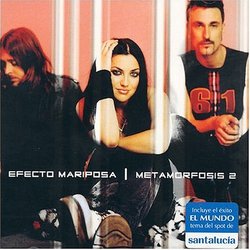| All Artists: Efecto Mariposa Title: Metamorfosis II Members Wishing: 0 Total Copies: 0 Label: Universal Release Date: 4/6/2004 Album Type: Import Genres: International Music, Latin Music Style: Latin Pop Number of Discs: 1 SwapaCD Credits: 1 UPC: 602498662410 |
Search - Efecto Mariposa :: Metamorfosis II
 | Efecto Mariposa Metamorfosis II Genres: International Music, Latin Music
|
Larger Image |
CD Details |
CD ReviewsTruth in advertising. Watujel | San Antonio, Texas | 12/12/2005 (3 out of 5 stars) "They warned us. This album cover doesn't show them hippie-ing around in a field this time - the neat eyeliner and the crisp black leather say "we're rocking for The Man now - are you gonna follow us anyway?"
As enamored as I was with their self-titled debut, I had to take a chance. It was a jolt at first - the guitars rock harder in kind of a generic arena style, vocalist Susana Alva sounds a bit less winsome - couldn't they have done just one more album in their previous style? Add to that the fact that the melodies in many cases are a little less memorable and the chords a little more play-it-safe, and I can't call this anything but a sophomore slump, combined with an ill-advised attempt to pander to a younger audience. However, it may be that such a stylistic leap was necessary given the departure of keyboardist Raúl Osuna, whose absence seems to have something to do with their blanded out songwriting. There's nothing here that's embarrassing, just more "ok" background songs rather than great stuff. This time around, the music for the best song, "Qué Más Da" (adapted as "Boba Niña Nice" for teen idol Belinda), was written outside the band. Standouts that feature more of the band's creative input are "Díme Dónde," which starts out as a stuttering pop/funk track before blasting into all-out rock, and the idealistic, orchestral power ballad "Flotando Voy." Perhaps to let us know that inside, they're still the same old smart Efecto Mariposa we came to know and love, they include a live version of "Sola" with the old-school arrangements (in fact, I wonder how much of that playing was really live). But the obligatory "sing-along" moment is unintentionally funny, as Susana only seems to trust the crowd with one word - the song's title! To be fair, the subsequent lyrical phrasing is probably too fast for a stadium crowd to enunciate. "Metamorfosis 2" isn't bad, but I wonder if a band that created its original fan base with musically substantive pop can truly carry on without Raúl Osuna. " |

 Track Listings (11) - Disc #1
Track Listings (11) - Disc #1